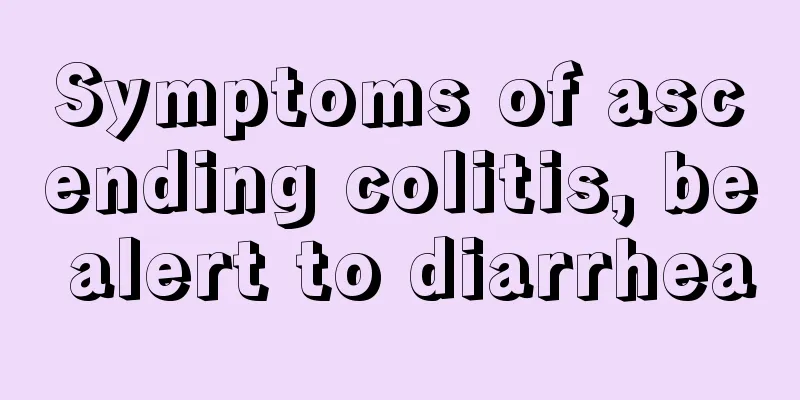Symptoms of ascending colitis, be alert to diarrhea

|
Ascending colitis is a type of chronic colitis, and its corresponding disease is descending colitis. Diarrhea is the most obvious symptom of ascending colitis, while descending colitis can cause constipation. There are many symptoms of chronic colitis, so it needs to be treated as soon as possible and pay attention to daily care. 1. Symptoms of ascending colitis Chronic colitis is divided into ascending colitis (right abdomen) and descending colitis (left abdomen). Ascending colitis is mostly diarrhea, especially early morning diarrhea. Descending colitis is mostly constipation. 2. Symptoms and signs of chronic colitis 1. Digestive tract symptoms Intermittent abdominal pain, bloating and abdominal pain are often the main manifestations of enteritis. It is especially prevalent when exposed to cold, eating greasy food, experiencing emotional fluctuations, or after being tired. The frequency of bowel movements increases, with several times or dozens of times a day, anal prolapse, and uncomfortable bowel movements. During acute attacks of chronic enteritis, high fever, abdominal cramps, nausea and vomiting, and urgent watery or sticky, frozen, bloody stools may occur. 2. Diarrhea It is the most common symptom of colitis, and is often accompanied by abnormal stools such as mucous bloody stools, watery stools, mucous stools, and loose stools. In mild cases, bowel movements occur every 1 to 2 hours, and the stool is sometimes filled with mucus, pus, and blood, or watery stool without feces. 5% of patients with ulcerative colitis may experience constipation, which is mostly a case of enteritis. Because there is blood in the stool, it is often mistaken for hemorrhoidal bleeding. 3. Constipation Colitis and proctitis are the causes of constipation, which can be caused by systemic metabolic disorders, nervous system diseases, or small anal fissures in the anus. 4. Intestinal bleeding It is one of the first major symptoms of ulcerative colitis. In most cases, blood is mixed in liquid stool and may adhere to the outside of the stool during defecation. 5. Signs of enteritis Long-term abdominal discomfort or dull pain in the lower abdomen. Physical examination may show mild tenderness, hyperactive bowel sounds, and rectal prolapse, mainly in the abdomen, around the umbilicus, or in the lower abdomen. |
<<: Is colitis serious? These symptoms should be taken seriously
>>: How to treat colitis, many dietary precautions
Recommend
What to do if your hair is thin and oily?
Hair has a great relationship with a person's...
Can I vaccinate my four-month-old child?
In today's society, girls often have unexpect...
My knees hurt when I stand up after squatting for a long time
Our knees bear our weight during our daily activi...
How can obese men prevent prostate cancer? What are the methods to prevent prostate cancer?
The prostate is very important for male friends, ...
How to treat oral mucosal burns?
The oral mucosa is the first barrier for food to ...
Red and swollen acne on chin
Once acne appears on the chin, they will appear q...
How to deal with expired medicines?
Nowadays, every household has some medicines, mai...
Is brain cancer contagious?
Brain cancer refers to a malignant tumor that occ...
Diet therapy for patients with yin deficiency and internal heat type of renal cancer
Kidney cancer patients suffer from poor blood flo...
Why do you get uterine cancer
Uterine cancer includes some uterine cancers, suc...
What fruits can reduce internal heat in summer?
There are really many varieties of fruits and man...
How to effectively treat lumbar myositis
Psoas myositis is a disease in which the lumbar m...
Cost of treatment for advanced liver cancer
However, it should be noted that the cost of inte...
How to treat HPV68 positive
Many people don't know much about HPV68. They...
What's the matter with sticky phlegm in the throat
In daily life, many people will find that when th...









